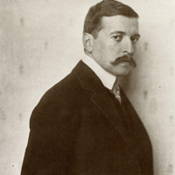
Hugo von Hofmannsthal
Playwright, Librettist
Biography
Hugo von Hofmannsthal
Hugo Laurenz August Hofmann von Hofmannsthal was an Austrian poet, novelist, librettist, playwright, and essayist. Born on February 1, 1874, in Vienna, von Hofmannsthal began writing poems and plays at a young age, and he began publishing poems at 16 years old under the pseudonyms Loris Melikow and Theophil Morren. He studied law and philology at the University of Vienna, and after leaving in 1894, he spent a year in the military.
Back in Vienna, von Hofmannsthal, a member of the Symbolist movement, belonged to the avant-garde writing society, Jung Wien (Young Vienna), where he rubbed elbows with renowned Austrian writers Arthur Schnitzler and Peter Altenberg. Von Hofmannsthal began his career writing lyrical plays and poetry, but in 1902, he wrote Ein Brief (A Letter, or alternatively, The Letter of Lord Chandos), an essay that renounced lyrical forms of writing and confronted the idea that there is an inherent futility in language, forever changing the way he wrote.
In 1900, von Hofmannsthal met the German composer Richard Strauss, and the two began a 23-year collaboration during which they wrote several operas together. Von Hofmannsthal wrote the libretti, and Strauss composed the scores. Some of these operas include 1909’s Elektra, an adaptation of Sophocles’s ancient Greek play of the same name, 1911’s Der Rosenkavalier (The Knight of the Rose), about a young pair of lovers who devise a comic plot so that one of them can be let out of her forced engagement, and Die Frau ohne Schatten (The Women Without a Shadow), which chronicles the story of an empress whose humanity is at risk if she doesn’t find a way to gain a shadow before time is up.
Von Hofmannsthal, a staunch nationalist, worked for the Austro-Hungarian government during World War I, writing speeches and articles and highlighting the importance of the nature’s cultural tradition. In 1920, von Hofmannsthal, Strauss, and others founded the annual Salzburg Festival. During von Hofmannsthal’s lifetime, he was nominated for four Nobel Prizes for Literature, but he never won. Von Hofmannsthal died on July 15, 1929, at age 55, of a stroke two days after his son Franz’s suicide.
Shows
Shows associated with Hugo von Hofmannsthal
Songs
Songs from shows associated with Hugo von Hofmannsthal
Videos
Videos associated with Hugo von Hofmannsthal
Quizzes
Quizzes associated with Hugo von Hofmannsthal
Additional Information
N/A